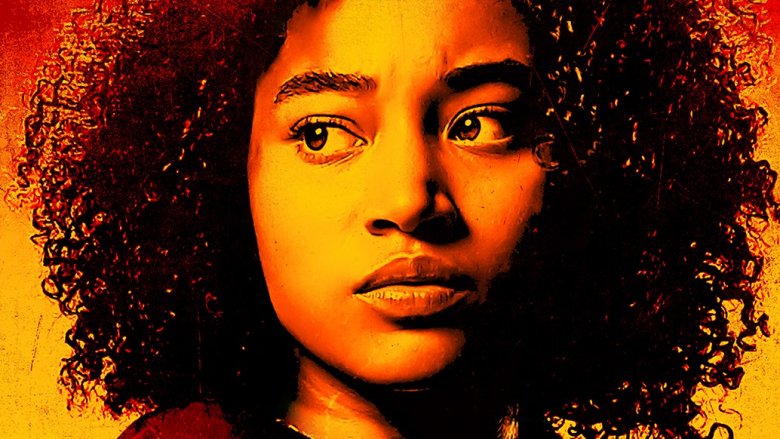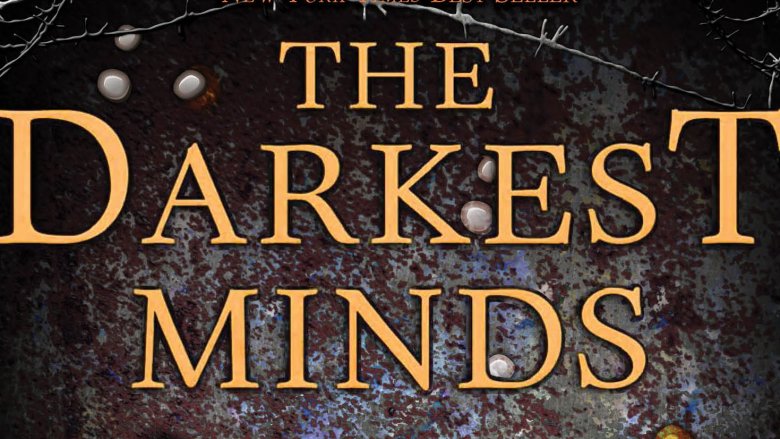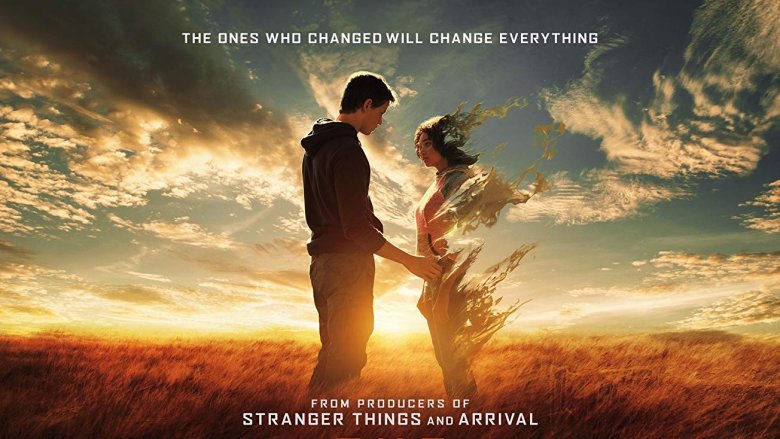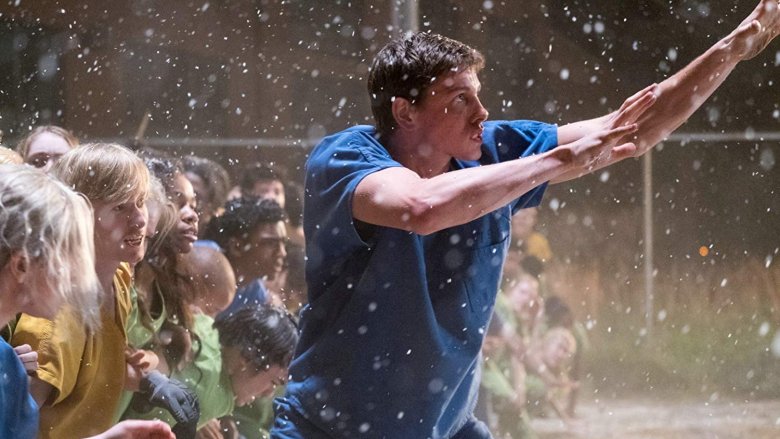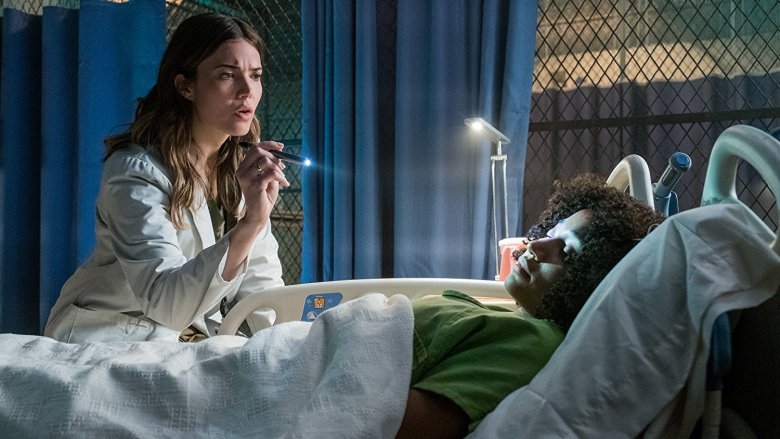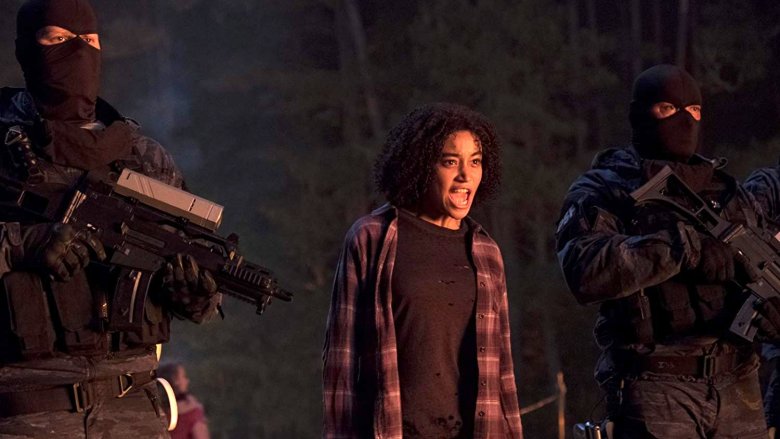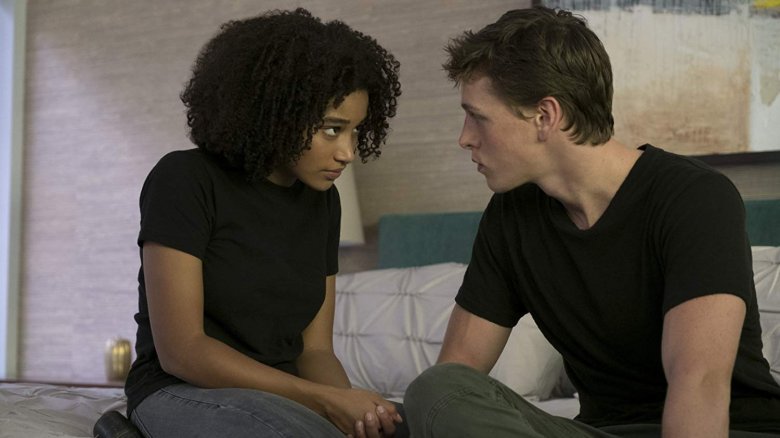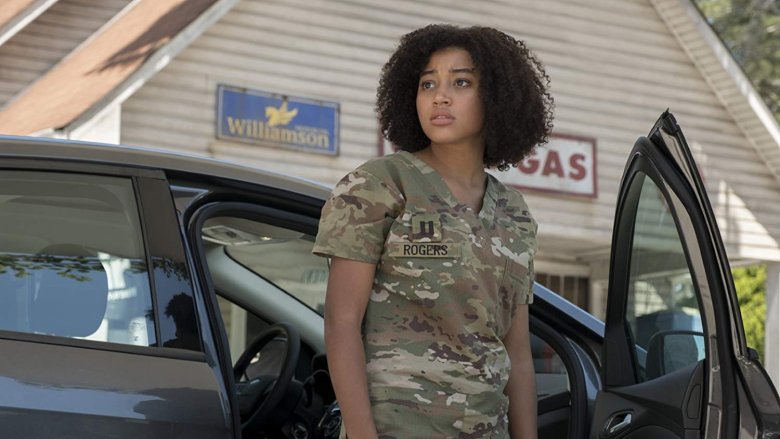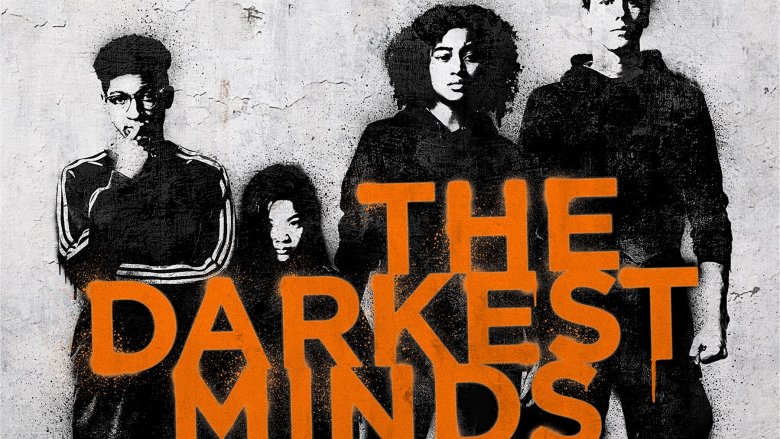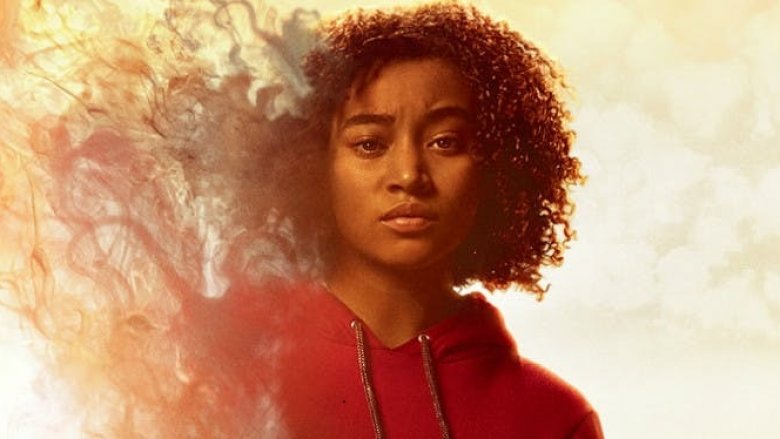Why The Darkest Minds Bombed At The Box Office
These are dark times for The Darkest Minds. Over the first weekend of August 2018, the young adult novel series turned hopeful film franchise was introduced to moviegoers by 20th Century Fox — and audiences were not interested. Released in 3,127 theaters, the adaptation was met with a resounding splat at the box office, earning only around $6 million from domestic theaters and not faring much better overseas. It's enough to mark the movie as having one of the worst opening weekends of all time for a release of that size — so you can probably say goodbye to any adaptation of the series' second book.
But which fateful stars aligned to sink the fortunes of The Darkest Minds? Why did this adaptation fail where
The Hunger Games soared (and The 5th Wave, well, floated)? Why did The Darkest Minds bomb at the box office? Follow our signal — we have the answers that you seek.
Black is the color
Considering how few people went out to see the movie, a good first question to ask might be: What even is The Darkest Minds?
Based on a six-book series of the same name by Alexandra Bracken, the film centers on a near-future apocalypse in which the vast majority of the United States' children fall victim to a mysterious disease called IAAN — or "idiopathic adolescent acute neurodegeneration." While the illness simply kills most of the people under 20 that it infects, the lucky survivors are gifted with immense powers — with the manifestation of those powers being visible thanks to the color peoples' eyes glow when they use them. Greens are simply very intelligent, while blues are telekinetic, and golds can control electricity. The most powerful are the oranges, who can control minds, and the reds, who can summon and control fire.
In the confusion after the plague's devastating onset, the powerful survivors are seen as such a threat that they are ripped away from their families and placed into internment camps. Rumors swirl about what happens to the most powerful kids, with the oranges and reds either being enlisted by authorities as government enforcers or outright killed.
The main character is Ruby Daly, an orange of immense power who disguises herself as a green for her own survival. When her true nature is exposed, she flees her camp with the help of a sympathetic doctor and sets out to form an alliance with other runaways, trying to find a safe haven for other kids like them.
Muddled marketing
So the plot sounds fairly simple, right? Good kids with superpowers are on the run from bad adults. Inexplicably, the marketing team behind the movie didn't really manage to convey any of that. Both the poster for the movie and one of its trailers makes the story look like a Nicholas Sparks adaptation meeting the climax of Avengers: Infinity War, which is surprisingly not as appealing as your imagination might make that seem. Another more action-oriented trailer makes The Darkest Minds seem like the cheapest X-Men movie yet. In all the marketing materials, the premise is underexplained, with the set pieces only really resonating if you're already familiar with elements of the source material. It all begs the question: Who are these promos meant to attract?
The best appeal the marketing team can muster to get regular old filmgoers into seats is identifying the movie as being "from the producers of Stranger Things and Arrival" — two totally different properties that don't tell you anything about the sort of movie you're going to get here. Is The Darkest Minds an '80s throwback with a suburban setting and a Spielbergian feel? Or is it a slow and cold sci-fi movie for adults about communication and free will? Because it looks like neither.
They may as well have just leaned into the fact that the movie comes from the director of Kung Fu Panda 2 and 3. Why not? Those charming animated movies are about as similar to The Darkest Minds as Arrival is.
Off-brand superheroes
Instead of selling the movie adaptation on what makes it seem unique, The Darkest Minds hit theaters looking painfully derivative of other, more successful properties that have come before. While the books may do their own thing, the movie adaptation pitched itself as something between X-Men, Chronicle, and any number of post-apocalyptic YA series that already got the adaptation treatment like The Maze Runner, The 5th Wave, or Divergent.
If you've been paying attention to the cinematic and TV landscape at all over the past 10 or 15 years, you've truly seen all of this before. The plot evokes superpowered teen runaway stories like the Marvel-branded Runaways, The Gifted, and Cloak and Dagger, but without having nearly as much rich history or originality to draw on. And that's just stuff that came out in the last year.
This movie features characters who have telekinesis, mind control, and power over electricity — just like you've seen before in X-Men, Star Wars, and Black Lightning, usually multiple times in each. That this story comes from an original, unrelated property doesn't matter when it's so clearly cribbing its interesting qualities from decades' worth of other work. There's really no way around it — this story feels as though it's been told before, and what ended up in theaters came across to prospective viewers as a copy of a copy of a copy.
Give it some star power
When it comes to box office draws, the movie does have names, but in the wrong places.
Even the casual consumer of modern TV and film is probably going to recognize the names or faces of This is Us' Mandy Moore, The Handmaid's Tale's Bradley Whitford, and Game of Thrones' Gwendoline Christie. The problem is, these actors aren't the movie's leads — they aren't on the posters, and they aren't the movie's point. Instead, the heavy promotional lifting is left to the younger kids in the cast, none of whom have really established themselves as marketable draws at this point in their careers, despite how talented they may be. The closest the film has to a young breakout star is Amandla Stenberg as main character Ruby Daly, evoking memories of her turn as Rue in The Hunger Games. But as far as name actors go, that's it. This is like if they tried to sell the Jumanji sequel with the actors who played the high school students on the posters instead of Dwayne Johnson and company. Use your stars, folks! Isn't that why you hired them?
Basically, a whole lot of things have to go right in order for a movie to be made and get launched successfully. You could launch a movie without name actors, provided the premise is strong enough and the marketing campaign does a good enough job of implanting the hook in peoples' minds. Thanks in part to subpar marketing, that didn't happen here.
Murky action
One part of the reason why The Darkest Minds movie didn't appeal to those outside of its book-reading fanbase on opening weekend might have to do with the impression that it just wasn't made in an appealing way. As several reviews for The Darkest Minds have pointed out, the movie doesn't have what it takes to impress when it comes to its filmmaking craft — particularly with the action set pieces, which have been described as incoherent.
The Darkest Minds is directed by Jennifer Yuh Nelson, an Emmy award-winning artist and director who was previously up for an Oscar for her work as the director of Kung Fu Panda 2. But though she's worked in animation for decades now, The Darkest Minds is only her third feature as director, and her very first live-action project.
While the movie's premise has drawn comparisons to the X-Men movies, The Darkest Minds can't hold a candle to that franchise's often inventive, adrenaline-pumping set pieces. A version of the X-Men with only the social commentary and none of the spectacle is... well, kind of a lousy version of the X-Men. Also, a dearth of action-packed money shots makes it harder to sell the movie to audiences that want superhero-style thrills, contributing to what made this project such a weak draw at the box office, and made so many people head over to catch the fifth weekend run of Ant-Man and the Wasp instead.
Cut-rate
Other writeups of The Darkest Minds have described the movie as having the look of a CW pilot, and while we happen to really like those Arrowverse TV shows, a big part of their charm comes from the fact that they look pretty cheap. It's a short way of saying that The Darkest Minds is not the kind of production that is flattered by a big-screen presentation — something that's been pointed out not just by professional film reviewers, but also in many comments on the YouTube pages for the movie's trailers. You don't need expertise to notice that there's not a whole lot of spectacle to this supposedly spectacular story.
At a reported budget of $34 million, there's understandably not a lot of money to throw around to produce set pieces this material would seem to demand, leaving the movie looking every bit like an inexpensive production shot at the cheapest locations that Atlanta, Georgia has to offer. On its own, this isn't a bad thing, but it does make one wonder — why trek out to the movie theater when you can pull up some straight-to-Netflix silliness that looks just as good, or even better?
IP for IP's sake
Hollywood chases trends. With the majority of American film and television production being based out of Los Angeles, there's a whole swath of the country that the people who greenlight movies just aren't connected with. They don't really know what people like, and a lot of the time, it seems that major studios are flailing about in every direction taking all suggestions in pursuit of their next hit. That's why you still stroll by posters for movies like The Darkest Minds at your local theater while saying to yourself "Huh? What? How did this get made?" Well, someone out there in Tinseltown thought you would really like it.
In particular, studios are absolutely obsessed with intellectual property, and adapting something that already exists in another form — whether it's Candy Land, Candy Crush, or literally candy. According to Hollywood logic, any movie based on IP has a better chance at success than a movie based on no IP, even if that IP is not particularly well-known. This is how The Darkest Minds can get made even if a great number of people have never even heard of it. As a result, this is also how a movie like that can bomb so badly, with producers putting too much value on the property and forgetting to do everything they can to make sure they have a quality film to go along with it.
The YA train has left
One of Hollywood's biggest trends in the last decade has been the explosion of adaptations of young adult properties from the well-known to the unknown. You know the ones we're talking about — Twilight! Percy Jackson! A Series of Unfortunate Events!
After the titanic success of the Harry Potter movies, bookshelves from school to school were picked clean by industry producers, all looking for the next big property that the kids can't stop talking about. In their frenzy to match the success of Harry Potter, there were some billion-dollar Hunger Games-level successes, and other major failures in the vein of The Seeker: The Dark is Rising. But where that trend was once dominant, now it is clearly receding, which makes this movie feel shockingly late to the YA-adaptation party.
Most damning is the overwhelming sense that The Darkest Minds has nothing new to say. Down the line, negative reviews for The Darkest Minds have characterized it as a cliche-addled romp through tropes we've been through many times before. At one point, the movie actually evokes the Harry Potter series, hinting that the band of magical misfits at the center of this story is comparable in nature to the kids of Hogwarts. The Darkest Minds suffers from the comparison, which only serves to highlight just how far away we are now from where we were around 2001, when this trend really got kicked off, and everything about it felt new.
The darkest legacy
So — what is the actual long-term damage here? It's actually not quite as bad as you might think. While The Darkest Minds is facing a terrible opening weekend with abysmal reviews and a discouraging B Cinemascore, and is likely functionally DOA when it comes to its theatrical release, the picture may actually end up making money. Budgeted at only $34 million with marketing costs that are likely half of that (or quite possibly less, considering how limp this movie's marketing campaign was), there actually is an avenue for The Darkest Minds to make a little money for its investors through home media sales and syndication. It won't be pretty, and it won't happen fast, but there is a way forward for this movie that doesn't result in everyone involved losing their money. After all, The Fifth Wave didn't exactly make a splash in its opening weekend, yet it still went on to earn $109 million. In the long run, that's a success.
Unfortunately, despite ending with a crushing sequel hook that leaves a central character's life in the balance, the odds of seeing The Darkest Minds continue forward on the big screen are slim. But bigger franchises than The Darkest Minds have foiled their film adaptations before this — we're looking at you, The Dark Tower. This story may seem over, but it's not necessarily a tragedy. Something tells us that this talented cast at least will walk away from this soft opening relatively unscathed.
